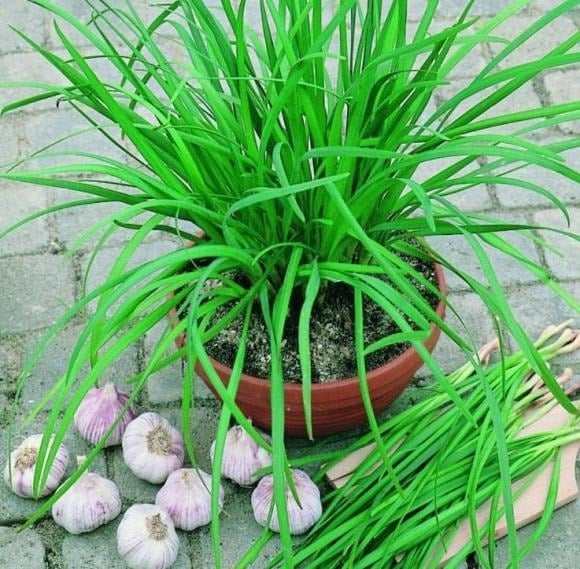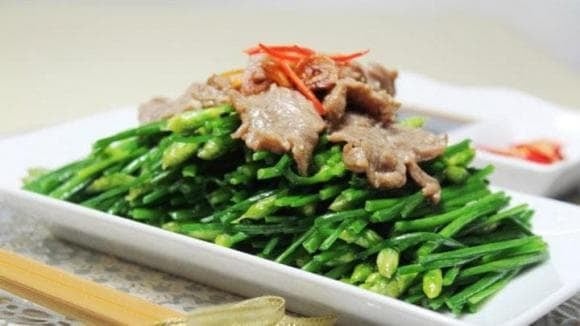Chives, though resembling green onions, possess a distinct and prominent aromatic quality. This herb is a common ingredient in soups, stir-fries, and particularly, wonton noodles. However, not everyone appreciates the flavor of chives.
This plant is easy to cultivate and rarely falls prey to pests. All you need is a few sprigs from a neighbor’s garden, and you can easily propagate them in a pot. Chives grow rapidly, adding lush greenery to your living space.
In traditional Chinese medicine, chives are known as Allium ramosum L., belonging to the onion family. Chives boast a myriad of medicinal properties, including the treatment of back pain, colds, constipation, skin infections, and worm infections.
Various parts of the chive plant, including its leaves, seeds, and roots, find utility. In culinary applications, the leaves and flower buds are particularly tasty and nutritious. Chive leaves are replete with vitamins and roughage, enhancing intestinal peristalsis, aiding digestion, alleviating constipation, and thwarting colorectal cancer. Additionally, chive leaves expedite the dissipation of blood stasis, foster blood circulation, and detoxify the body.
Notable Benefits of Chives
Combating Intestinal Bacteria: Chives, beyond their role as a familiar seasoning, excel at assuaging coughs and sore throats. You can pound the leaves to create a gargle, or steam them with honey for throat relief. Chives contain precious compounds like sulfides, saponins, and bitter substances, notably odorin, deemed a natural antibiotic capable of vanquishing Staphylococcus aureus and Bacillus coli. Fresh chive juice also touts intestinal antibacterial properties, quelling sore throats and skin abscesses.
Lowering Blood Pressure and Cholesterol: Akin to garlic, chives harbor allicin, a natural antibiotic that diminishes blood pressure and forestalls the genesis of detrimental cholesterol within the body. Moreover, chives exhibit antibacterial and antifungal traits, bolstering the eradication of bacteria and fungi in the intestines, thereby enhancing digestive efficacy.

Boosting Digestion: In traditional Chinese medicine, chives are harnessed to galvanize digestion, assuaging constipation and diarrhea while facilitating defecation. Chives benefit the liver and stomach and can ameliorate constipation and stomach aches. Constituents like protein, fat, calcium, iron, carotene, vitamin C, and dietary fiber in chive leaves augment intestinal peristalsis, stimulate appetite, and suit those grappling with constipation.
Bolstering Cancer Prevention: Chives, endowed with sulfur, carotene, and vitamin A, impede the proliferation of cancer cells and curtail their dissemination in the body. Thus, incorporating chives into your daily diet serves as an efficacious cancer prevention strategy.
Enhancing Sexual Health: Chives bolster male sexual health, with their seeds often soaked in alcohol alongside herbs like three-spur, ginseng, and velvet antler to enhance virility. Additionally, fresh chive juice and chive soup are harnessed to combat impotence, nocturnal emissions, and premature ejaculation. Elevated female consumption of chives may alleviate back pain, frequent urination, leukorrhea, and sexual apathy.
Optimal Chive Consumption
Chive leaves, endowed with a pungent flavor and warm nature, should be consumed in moderation, precluding excessive intake. Chives typically find application as a seasoning or in stir-fries and soups. Given their ample roughage content, which challenges digestion, overconsumption may induce diarrhea. It is advisable to ingest approximately 100-200 grams per meal.

Individuals with digestive ailments ought to eschew chive leaves, refraining from concurrent consumption with milk. Chive soup should be freshly prepared and not consumed after being left overnight.
When preparing chive leaves, it is imperative to mince them finely and stir-fry them over high heat, executing the process swiftly to prevent the leaves from disintegrating, compromising their taste, and subjecting their sulfides to degradation.
Additionally, individuals grappling with ocular afflictions, internal heat, gastric weakness, or abscesses should refrain from ingesting chive leaves.





























